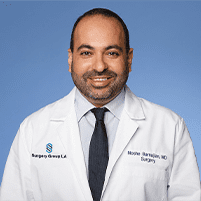Ulcerative Colitis

Moshe Barnajian, MD
Minimally Invasive and Robotic Colorectal Surgeon based at Cedars Sinai, Los Angeles
Ulcerative Colitis, or UC, is a chronic, inflammatory bowel disease that affects the colon and rectum. Symptoms can range from mild to severe and ultimately patients can develop colorectal cancers. Symptoms include:
- Abdominal pain and cramps
- Diarrhea
- Rectal bleeding
- Weight Loss
- Fevers
If you are experiencing any of these symptoms, consult your physician for appropriate evaluation
How is Ulcerative Colitis diagnosed?
After speaking with your doctor about your symptoms, they will review your medical history, diagnostic testing, including colonoscopy, and medical imaging.
How is Ulcerative colitis treated?
Treatment of Ulcerative Colitis depends on the severity of the disease. The goal of treatment is to calm the inflammation and allow patients to return to their daily activities. Fortunately, many cases can be managed medically. Mild diseases can be managed with anti-inflammatory medications or a short course of corticosteroids (prednisone). In the event of more severe cases, biologics or immune-modulating drugs (Remicade, Humira, or Entyvio) may be recommended.
When is surgery for Ulcerative colitis necessary?
Unfortunately, about 30% of patients with Ulcerative Colitis will need surgery sometime during their life. Surgery is necessary if the disease is not controlled with medications or there is concern about colorectal cancer. In addition, surgery is necessary if patients develop life-threatening complications such as bleeding, infection, or colonic perforation.
What are the surgical options for patients with Ulcerative Colitis?
Ulcerative Colitis can be commonly treated with a procedure called J pouch surgery. The procedure is also known as a Ileal Pouch Anal Anastomosis (IPAA). Depending on the situation, the procedure will be done in 2 or 3 stages. The procedure involves the removal of the entire rectum and colon and the creation of a J shaped pouch using a part of the small intestine. The J pouch is connected to the anus, allowing stool to pass comfortably. Dr. Barnajian would likely also need to perform a temporary Ileostomy for the first few months after surgery in order to allow your J pouch to heal.
Dr. Barnajian is one of the leading experts on J pouch surgery, particularly using the minimally invasive approach. He will review your case, and depending on your health, will perform your surgery in two to three stages.
While the J pouch surgery is a major abdominal procedure, it will provide relief to the chronic symptoms of Ulcerative Colitis. Dr. Barnajian’s expertise in this procedure and his minimally invasive approach will ensure better outcomes and faster recovery.
So if you or someone you love is struggling with Ulcerative Colitis, speak with Dr. Barnajian today.
